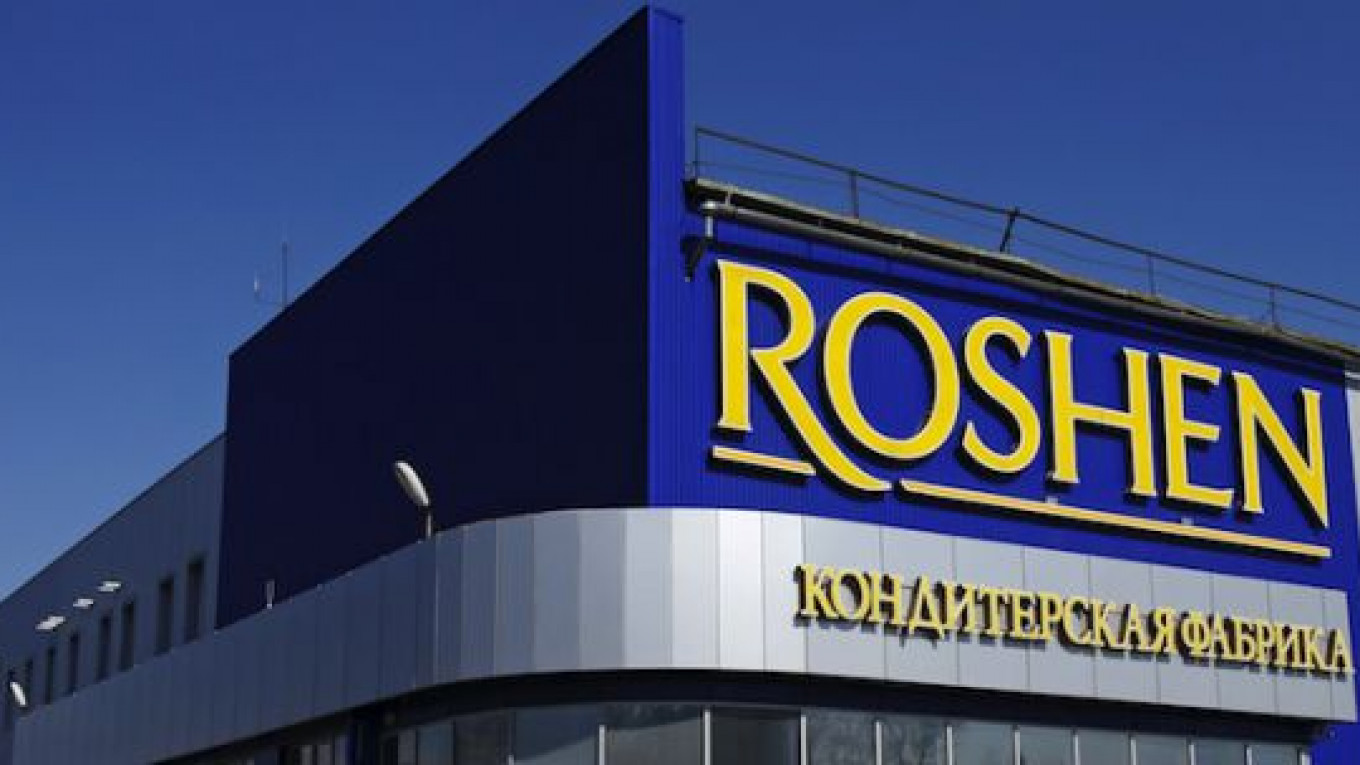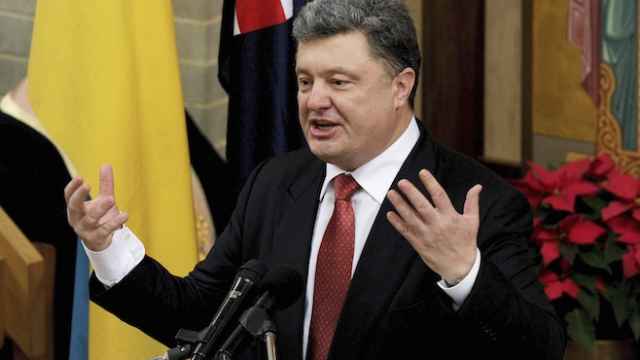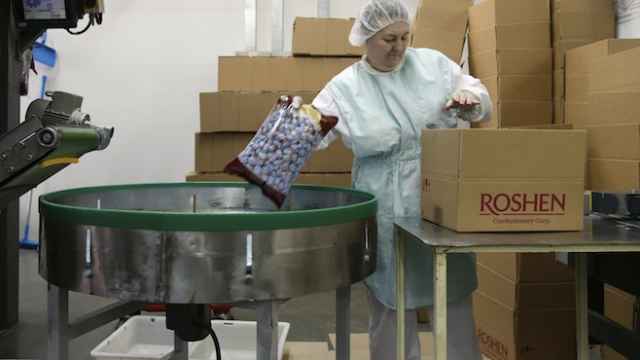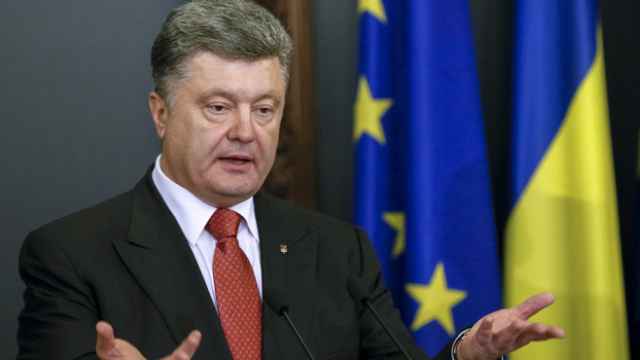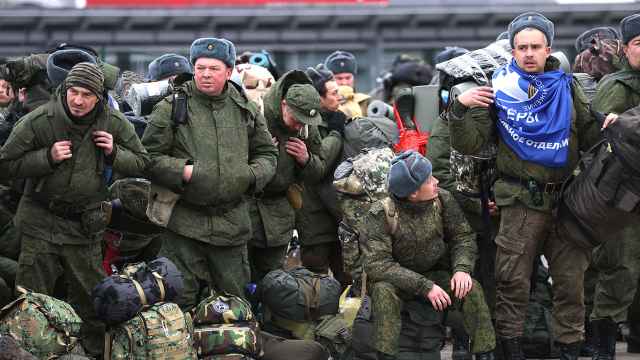LIPETSK — The fortunes of the Russian outpost of Ukrainian President Petro Poroshenko's candy empire have ebbed and flowed with the Russian-backed separatist conflict in the east of his country.
If the factory turning out toffees and jellied sweets in the southwestern town of Lipetsk is a bellwether for the direction of relations between Moscow and Kiev, things do not look good.
A new criminal case is hanging over them and the directors of the Lipetsk Confectionary factory are cutting staff, output and costs in a struggle to keep it alive.
The factory was first raided by armed police on March 18 last year, a day after the United States and European Union imposed sanctions linked to Russia's annexation of Crimea.
The official explanation was a ruling in a trademark dispute filed by a competitor back in 2010 and the Kremlin has denied any political connection.
The Crimea crisis was quickly followed by the start of the pro-Russian rebellion in eastern Ukraine, but after the rebels signed a first peace deal and Russian President Vladimir Putin and Poroshenko shook hands, pressure on the factory seemed to ease. The directors were able to settle both the dispute behind the March raid and another one.
Now that violence in Ukraine is fraying a second truce and anti-Ukrainian sentiment is still running high in Russia, their factory is being targeted again.
"I guess we knew that this would happen, that there would be another case … connected with our taxes because the tax inspectors have been checking and checking us for more than a year," said Oleg Kazakov, the Lipetsk factory's deputy director.
Russia's investigative committee opened its criminal case last month over accusations the factory had artificially inflated the cost of new buildings to increase reimbursements on its VAT payments. It says the factory defrauded the state budget of 180 million rubles ($3.6 million) in 2012-2013.
On April 24, Moscow's Basmanny Court ruled in favor of the committee's request to "arrest" or freeze assets worth 2 billion rubles from the factory, a spokeswoman for parent company Roshen said.
Thieves
Voronina, the factory's director and, like Kazakov, Russian-born and bred, struggles to contain her anger over what she calls the unfounded attacks on what has been her workplace for more than 45 years.
She helped to keep it afloat in tough times after the collapse of the Soviet Union in 1991 and helped to eventually find an investor in 2001.
The fact that the investor was Ukrainian didn't matter then. Now that he is the president of Ukraine means everything.
"Now they say we are thieves, stealing from the state budget … How? … If there is the rule of law, we will win," she said in between poring over documents and advice manuals to make sure her next board meeting is held according to the letter of the law because the company is "under constant scrutiny."
Putin's spokesman Dmitry Peskov has denied allegations of political interference, saying Russia wants trust in its business climate and it is "unjust to say that certain selective measures are undertaken against certain companies."
But Voronina asks how after checking, and rechecking, all their tax receipts for more than a year, the tax authorities only now discovered the alleged fraud, which blocks moves to sell the factory to another investor.
"Everyone is trumpeting 'Why doesn't Poroshenko sell his business as he promised?' … Well it can't be sold now that our assets have been arrested," she said.
Poroshenko, whose candy empire spreading from Ukraine to Russia, Lithuania and Hungary helped make him a billionaire, promised to sell his business after becoming president last year following the ouster of a pro-Russian leader in February.
But any possible deal for Roshen — named after the two middle syllables of his surname — with potential buyers such as global confectionary firms Nestle and Cadbury's parent Mondelez so far has been stymied by political turmoil.
It is a similar story across Ukraine and Russia, where uncertainty over separatism in Ukraine and sanctions against Russia seen as fueling it have sapped foreign investment.
Capital flight from Russia ballooned last year to $151.5 billion, while from Ukraine it reached $11.1 billion.
Roshen started talks with potential buyers for just the Russian business in the dusty, provincial city of half a million people late last year.
"We were in the process of negotiations and finding a buyer, but some of the assets were arrested by the Basmanny court until December 13, 2015, so it means we have no possibility to sell our assets," a Roshen spokeswoman said.
For the time being, the factory is, as Kazakov says, "a real headache for everyone."
"My Baby"
The new investigation is even more worrying for him because he oversaw the construction of the warehouse-factory complex which would have produced 250,000 tons of sweets and chocolate a year.
"I know for sure that today I may be a witness, but tomorrow I could be treated as a suspect and could be arrested. That could happen very easily," he said.
But as he shows off the single completed wing of the vast project, he whispers: "It is my baby."
Outside, the railway track sits unused and one loading bay out of 20 is working. Inside, a lone forklift whizzes around the buffed floors, stacking boxes of sweets in mostly empty stores.
"This is what they say was overpriced," said Kazakov, whose annoyance over the charges has landed him in a testy verbal battle with the spokesman for the investigative committee.
When Kazakov alleged that someone was trying to reduce the value of the Lipetsk factory with the case, the committee's spokesman, Vladimir Markin, wrote on Twitter: "Someone has sold his country for 30 hryvnias and is still bathing in chocolate."
By referring to 30 hyrvnias, Markin was making a reference to Judas, the biblical disciple of Jesus whose price for betraying him was 30 pieces of silver.
In the light of such statements from Russian officials, the Lipetsk directors have little faith they will win their case and, after making a loss last year, they fear for the future.
By August, only 800 workers will be left out of 2,000 and output has fallen to 5,000 tons a month from 10-12,000 before.
"Everyone asks us, so what's happening? And I simply say that we are working," Voronina said.
"But I guess some people don't like that. How can you still work? They've seized your assets. They've done this. And we answer: 'And so what? We have orders, so we work on'."
A Message from The Moscow Times:
Dear readers,
We are facing unprecedented challenges. Russia's Prosecutor General's Office has designated The Moscow Times as an "undesirable" organization, criminalizing our work and putting our staff at risk of prosecution. This follows our earlier unjust labeling as a "foreign agent."
These actions are direct attempts to silence independent journalism in Russia. The authorities claim our work "discredits the decisions of the Russian leadership." We see things differently: we strive to provide accurate, unbiased reporting on Russia.
We, the journalists of The Moscow Times, refuse to be silenced. But to continue our work, we need your help.
Your support, no matter how small, makes a world of difference. If you can, please support us monthly starting from just $2. It's quick to set up, and every contribution makes a significant impact.
By supporting The Moscow Times, you're defending open, independent journalism in the face of repression. Thank you for standing with us.
Remind me later.


